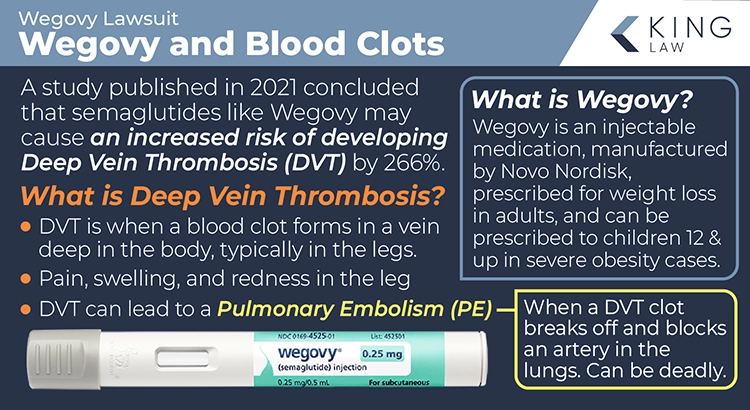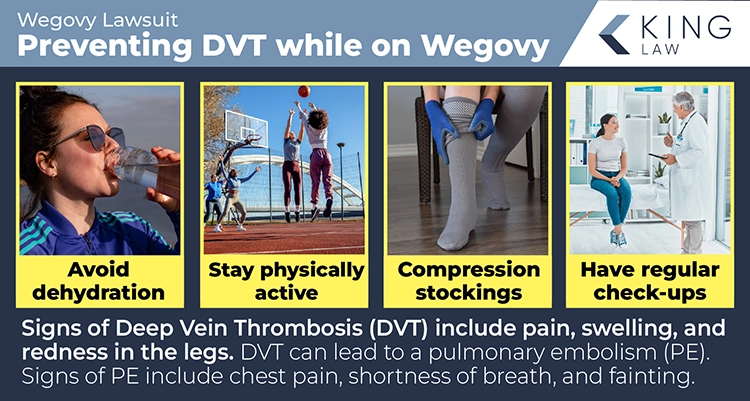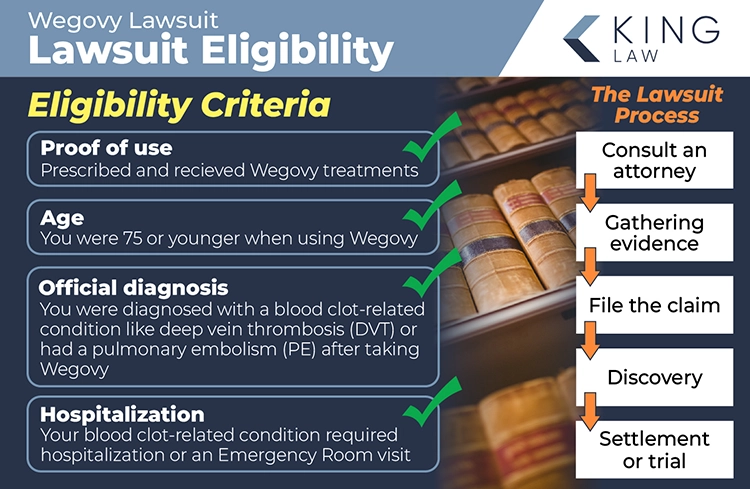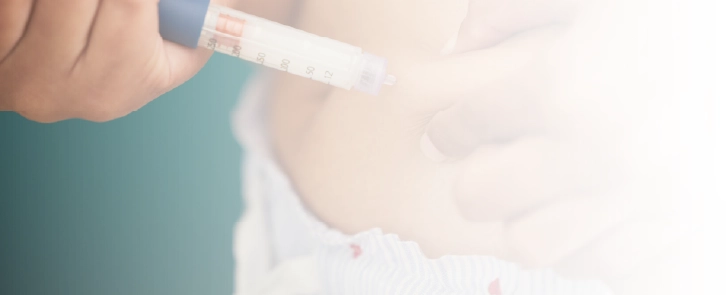
Nationwide, individuals are filing lawsuits against Novo Nordisk, the manufacturer of Wegovy, alleging the pharmaceutical company failed to warn patients and healthcare providers about the risk of blood clot-related injuries and health complications associated with the drug’s use. Litigation against the manufacturer is ongoing but is anticipated to grow significantly in the coming weeks and months as more affected individuals come forward.
About the Wegovy Blood Clots Lawsuit:
Wegovy and Blood Clots Overview
Study Links Wegovy to Increased Risk of Blood Clots
What Are Blood Clots From Wegovy?
How Does Wegovy Cause Blood Clots?
Can Wegovy Cause Blood Clots in Your Legs?
Wegovy Side Effects: Blood Clots, DVTs, and Pulmonary Embolisms
Deep Vein Thrombosis and Pulmonary Embolisms
How Common Are Blood Clots Among Wegovy Users?
How to Prevent Blood Clots While Taking Wegovy
Other Semaglutide Drugs Linked to Blood Clots
Eligibility Criteria to File a Wegovy Blood Clot Lawsuit
How to File a Wegovy Blood Clot Lawsuit
Wegovy Blood Clot Settlement and Payout Amounts
Have You Experienced Blood Clots While Taking Wegovy?
Wegovy and Blood Clots Overview
Wegovy lawsuits claim that Novo Nordisk, the manufacturer of the weight loss drug, failed to warn users about blood clot-related injuries, such as deep vein thrombosis (DVT) and pulmonary embolism. Individuals who have been diagnosed with blood clots or a related condition are encouraged to contact an experienced lawyer to determine if they may be eligible for compensation.
Allegations against the company claim that Wegovy (generic name Semaglutide) causes gastrointestinal issues, vision loss, and now blood clot-related side effects. The lawsuit suggests Novo Nordisk was aware of the risks associated with GLP-1 drugs like Wegovy and failed to warn consumers, particularly considering blood clots are not listed as a potential side effect by the manufacturer.
Wegovy is a GLP-1 receptor agonist (RA) drug primarily used for weight management through appetite suppression. It is widely prescribed for weight loss, gaining popularity for its effectiveness. Despite this, there are growing concerns over its serious side effects, including blood clots, DVTs, and pulmonary embolisms.
Study Links Wegovy to Increased Risk of Blood Clots
According to a 2021 study titled “Comprehensive analysis of the safety of semaglutide in type 2 diabetes: a meta-analysis of the SUSTAIN and PIONEER trials,” semaglutides may increase a person’s risk of developing deep vein thrombosis (DVT) by 266%. The study was published in Volume 68, Issue 6 of the Endocrine Journal and authored by Dao-Gen Yin, Liang-Liang Ding, Hai-Rong Zhou, Mei Qiu, and Xue-Yan Duan.
The objective of the study was to assess the risk of semaglutide leading to various serious adverse events (SAEs), including blood clots, in patients with type 2 diabetes. It found that taking a Semaglutide significantly increases the risk of deep vein thrombosis (DVT) by 266% (RR 3.66, 95% CI 1.09–12.25; I2 = 0). While there was no specific mention of pulmonary embolism (PE) risk, increased DVT risk raises concerns, as DVT can lead to PE.
Additional studies are needed to determine causation; however, the increased DVT risk may be tied to diarrhea and dehydration common with semaglutide use, which could increase blood viscosity. Further research is needed to examine whether weight loss associated with Wegovy contributes to this risk.
The study was a meta-analysis that included 21 trials (10 PIONEER and 11 SUSTAIN trials) involving 12,260 semaglutide users and 14,176 comparators. Risk ratios (RRs) and 95% confidence intervals (CIs) were calculated using random-effects and fixed-effects models. The study did not address long-term safety, as most trials had a follow-up duration of one year or less. Some findings also lacked sufficient statistical power due to wide confidence intervals.
As a result of the study, physicians prescribing Wegovy should monitor for signs of blood clots and ensure proper hydration to reduce risks, and caution should be used when prescribing Wegovy to patients with a predisposition to blood clots. While Wegovy generally has a good safety profile, the significant increase in DVT risk calls for careful monitoring, especially in patients at higher risk for these conditions.
What Are Blood Clots From Wegovy?
Wegovy (semaglutide) is a GLP-1 receptor agonist used to reduce the risk of major cardiovascular events in adults with known heart disease and obesity or who are overweight and to help adults and children aged 12 years and older with obesity.
A 2021 study indicates that taking a semaglutide may increase the risk of developing deep vein thrombosis or a blood clot that forms in the deep veins, usually of the leg. DVT is a leading cause of pulmonary embolism, which occurs when a blood clot breaks away and travels to the lungs. Blood clots can block blood flow in veins or arteries, leading to severe complications such as heart attack or stroke.
Symptoms of Blood Clots from Wegovy:
- Deep Vein Thrombosis (DVT): Swelling, red or discolored skin, throbbing, and tenderness in the affected area, often the leg.
- Pulmonary Embolism (PE): Sudden shortness of breath, dizziness, lightheadedness, chest pain, irregular heartbeat, and rapid heart rate.
- Blood clots: Pain, discomfort, and redness in the affected area or unexplained pain in the arms, legs, or other parts of the body.
Additionally, there is an increased risk for people with type 2 diabetes of plaque buildup in the arteries, which can lead to dangerous blood clots. Studies are ongoing to determine the precise relationship between Wegovy and blood clots. Recent studies have raised concerns about Wegovy’s potential side effects, including an increased risk of DVT. Patients taking Wegovy should be aware of blood clot symptoms and seek immediate medical attention if they experience any signs. Staying informed and vigilant about potential side effects is crucial when using this medication.

How Does Wegovy Cause Blood Clots?
Wegovy might cause blood clots through mechanisms like altered blood coagulation, inflammation, dehydration, and changes in blood flow. Patient-specific risk factors such as pre-existing conditions, lifestyle factors, and genetic predispositions may also play a role. Research into how Wegovy and other GLP-1 agonists may cause or contribute to blood clot formation is ongoing.
Potential Mechanisms for Blood Clot Formation with Wegovy (Semaglutide):
- Inflammation Some GLP-1 receptor agonists, including semaglutide, may cause inflammation in blood vessels, making them more susceptible to clot formation.
- Altered Blood Coagulation: Wegovy may affect the balance between pro-coagulant and anti-coagulant factors, increasing blood clot tendency.
- Changes in Blood Flow: Wegovy may influence blood flow by altering blood vessel tone and function, contributing to clot formation, especially in individuals with underlying vascular conditions.
- Dehydration: Gastrointestinal side effects such as nausea, vomiting, and diarrhea caused by GLP-1 receptor agonists can lead to dehydration, thickening of the blood, and increasing the risk of clot formation.
Patient-Specific Risk Factors:
- Pre-existing Conditions: Cardiovascular disease, history of clotting disorders, and other pre-existing conditions can increase the risk of blood clots when taking Wegovy.
- Lifestyle Factors: Obesity, prolonged inactivity, and a sedentary lifestyle are key risk factors for developing blood clots.
- Genetic Predispositions: Certain genetic factors may predispose individuals to a higher risk of blood clots when taking Wegovy.
People with type 2 diabetes who take Wegovy may have an increased risk of plaque buildup in their arteries, leading to dangerous blood clots, and should be carefully monitored. There is ongoing research into how GLP-1 drugs like Wegovy contribute to blood clot formation, emphasizing the need for continuous monitoring and study. Individuals diagnosed with a blood clot or related condition after taking Wegovy are encouraged to speak to an experienced attorney as soon as possible.
Can Wegovy Cause Blood Clots in Your Legs?
A 2021 study found that people taking semaglutide, like Wegovy, were 3.66 times more likely to develop deep vein thrombosis (DVT). Reports have linked the drug to blood clots in the legs, including DVT and other thromboembolic events.
Symptoms of Deep Vein Thrombosis (DVT) in Legs:
- Swelling: Sudden swelling in one leg is a common sign.
- Pain or Tenderness: Pain often starts in the calf, feeling like cramping or soreness, and may extend to the foot or thigh.
- Red or Discolored Skin: Skin over the affected area may become red or take on a bluish hue.
- Warmth: The skin around the clot area can feel warm to the touch.
- Visible Veins: Veins near the skin’s surface might become more visible or engorged.
- Leg Fatigue: A feeling of heaviness or tiredness in the affected leg.
- Difficulty Walking: Pain and swelling can make walking or standing more difficult.
Risk factors for developing blood clots include having a history of DVT or pulmonary embolism,
long periods of sitting or bed rest, such as during long flights or hospital stays, being overweight, having a family history of blood clots or clotting disorders, having inherited conditions like Factor V Leiden mutation, being over 60 years of age, or having diabetes.
If you are taking Wegovy and experience symptoms of a blood clot, such as swelling, pain, or redness in the leg, you should seek immediate medical attention. The condition could be life-threatening if a clot breaks loose and should be monitored closely.
Wegovy Side Effects: Blood Clots, DVTs, and Pulmonary Embolisms
Wegovy is a semaglutide used to reduce the risk of major cardiovascular events in adults with obesity or who are overweight and to help adults and children 12 years and older with obesity or who are overweight with a weight-related medical problem. A 2021 study shows that taking a semaglutide, like Wegovy, may increase your risk of developing deep vein thrombosis by up to 266%. Blood clots are clumps of blood that have changed from a liquid to a gel-like or semisolid state. They can form in veins or arteries anywhere in the body and can obstruct blood flow, leading to various complications.
Potential Blood Clot Side Effects:
- Deep Vein Thrombosis (DVT): A clot that occurs in a deep vein, usually in the legs. Symptoms of a DVT include swelling, pain, tenderness, and redness, often in the calf. If a part of the clot breaks off, it can travel to other parts of the body. Risk factors of a DVT include prolonged immobility, dehydration, a history of clotting disorders, and cardiovascular conditions.
- Pulmonary Embolism (PE): Occurs when a blood clot (often from a DVT) travels to the lungs, blocking a pulmonary artery. It can cause sudden shortness of breath, chest pain, rapid heart rate, lightheadedness, coughing up blood. The condition may be life-threatening and requires immediate medical attention.
- General Blood Clots: Symptoms include pain, swelling, redness, warmth, and visible veins. Risk factors are dehydration (possibly from gastrointestinal side effects of Wegovy), prolonged immobility, and underlying health conditions.
While taking Wegovy, it is crucial to drink plenty of fluids, especially if experiencing gastrointestinal side effects, and to avoid prolonged periods of immobility; take breaks to move around if sitting for long periods. Patients using Wegovy should be aware of these side effects and take steps to mitigate risks.
Deep Vein Thrombosis and Pulmonary Embolisms
Both deep vein thrombosis (DVT) and pulmonary embolism (PE) are types of venous thrombosis (VTE), and involve blood clots that form in veins and can cause serious health issues.
Deep Vein Thrombosis (DVT):
- A blood clot that forms in a deep vein, usually in the lower extremities.
- Commonly located in the legs, thighs, pelvis, and sometimes arms.
- Presents with pain, swelling, and redness in the affected leg.
- The primary risk is that part of the clot can break off and travel to the lungs, leading to a PE.
- Treated with anticoagulant medications, compression stockings, and lifestyle changes to prevent further clots.
Pulmonary Embolism (PE):
- Occurs when a piece of a DVT clot breaks off, travels to the lungs, and causes a blockage in an artery.
- Most PEs are caused by clots originating from the legs’ deep veins (DVT).
- Symptoms include chest pain, shortness of breath, and syncope (fainting).
- It can be life-threatening, causing damage to the lungs and other organs due to reduced blood flow and oxygen levels.
- Treatment may include anticoagulant medications, thrombolytic therapy (clot disorders), and surgical intervention in severe cases.
How Common Are Blood Clots Among Wegovy Users?
The 2021 meta-analysis of the SUSTAIN and PIONEER trials found that semaglutide users have a 266% increased risk of developing deep vein thrombosis (DVT). The study’s methodology involved 21 randomized trials with over 26,000 participants. The suggested mechanism for the increased risk is the higher incidence of diarrhea and dehydration experienced while taking the drug, leading to increased blood viscosity. Individuals taking Wegovy should take careful consideration to monitor for blood clot-related symptoms.
How to Prevent Blood Clots While Taking Wegovy
Staying hydrated and avoiding dehydration is imperative to prevent blood clots while taking Wegovy. You should also engage in regular physical activity to avoid prolonged immunity, use compression stockings when advised by a healthcare professional, and monitor for symptoms of blood clots like swelling and pain in the legs. Regular check-ups with a healthcare provider can help manage pre-existing conditions and ensure medication is adjusted as necessary.

Other Semaglutide Drugs Linked to Blood Clots
Other semaglutide drugs, including Ozempic and Rybelsus, have also faced scrutiny. These drugs have been linked to an increased risk of blood clots; however, additional studies are needed to confirm causation.
Eligibility Criteria to File a Wegovy Blood Clot Lawsuit
To file a Wegovy blood clot lawsuit, you must meet certain criteria. A timely legal consultation is essential to help ensure you meet all statutory requirements. An attorney can help determine whether you have a valid claim for compensation and what steps you need to take to move forward with your case.
Eligibility requirements for filing a Wegovy blood clot lawsuit:
- Received Wegovy treatments
- Received diagnosis of blood clot-related conditions such as deep vein thrombosis (DVT) or pulmonary embolism (PE) after taking Wegovy
- Be age 75 or younger
- The condition required an emergency room visit or hospitalization
Exclusions from a Wegovy blood clot lawsuit include that you had previous blood clot-related surgeries or treatments or received current treatments for other unrelated serious health conditions. If you are diagnosed with a blood clot condition after taking Wegovy, you should contact an experienced lawyer due to state-specific statutes of limitations. An attorney can ensure you meet the eligibility requirements and will file the lawsuit on your behalf.

How to File a Wegovy Blood Clot Lawsuit
When filing a Wegovy blood clot lawsuit, it is vital to adhere to the legal process. An attorney can help you manage the process and work to ensure you receive the best possible outcome in your case.
Step-by-step instructions for filing a Wegovy blood clot lawsuit:
- Consult with an attorney: The first step in filing a Wegovy blood clot lawsuit is to consult with an attorney experienced in these kinds of claims. An attorney will offer a free case review to verify whether you are eligible to file a lawsuit.
- Gather evidence: The next step in the process is to gather the evidence that may be necessary to prove your case. Evidence in a Wegovy blood clot lawsuit may include medical records, proof of Wegovy usage, expert testimony, scientific studies, and more. Your attorney can provide guidance about what documents and information you may need.
- File the claim: Once eligibility is confirmed and you have collected the necessary evidence, your attorney may recommend filing the claim. During the initial consultation, they will ensure that your case is filed within the state-specific statute of limitations or other deadlines.
- Discovery phase: Once the case is filed, it may enter into the discovery phase. During this phase, each party has the opportunity to depose witnesses and gather information. Your attorney will also enter into negotiations with the other party.
- Trial coordination: If a favorable settlement cannot be reached, the matter may be set for trial. If the decision is unfavorable in court, you may have the option to appeal. Depending on your retainer agreement, your attorney may help guide you through the process of an appeal and any post-conviction questions.
Wegovy Blood Clot Settlement and Payout Amounts
While there is no standardized settlement value for these kinds of cases, top-tier claims, including severe blood clot-related injuries or death, are expected to settle for between $400,000 and $700,000. However, settlements are not predetermined and may depend on several factors, including whether someone can return to work.
Types of Losses Covered:
- Medical bills: Claims related to blood clot injuries such as deep vein thrombosis (DVT) or pulmonary embolism (PE). These costs include emergency care, lab tests, treatments for blood clots, hospitalization, and recovery medications. Costs may vary based on location and severity of side effects.
- Lost Wages: Compensation for time off work due to Wegovy effects or treatments. You may also be entitled to coverage for diminished earning potential.
- Pain and Suffering: These are variable damages awarded for emotional distress.
- Punitive Damages: Allowed in some states to punish defendants for negligence or wrongful actions. May increase settlements for those with significant blood clot-related injuries.
Allegations include that Novo Nordisk did not adequately warn about Wegovy’s side effects. If you were harmed or suffered blood clots after taking the medication, you may be entitled to a financial recovery. You can help maximize compensation by understanding the full range of available damages. Your attorney will provide guidance on required documentation to demonstrate value and will negotiate to ensure a fair settlement is offered.
Have You Experienced Blood Clots While Taking Wegovy?
Did you experience blood clots or a related condition while taking Wegovy? Contact King Law if you have suffered from side effects from a blood clot. Our legal team has decades of experience helping those who need it most. We have the experience and knowledge necessary to get you the results you deserve.
Contact a Wegovy Blood Clot Lawyer
Contact King Law today to speak directly with an attorney who is well-versed in Wegovy lawsuits and will help you get the money you need. Our attorneys will guide you through the process and work to determine the best course of legal action.
Frequently Asked Questions (FAQs)
Read the questions related to Wegovy blood clots below.

